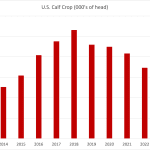By Phil Franz-Warkentin
Glacier FarmMedia MarketsFarm – The ICE Futures canola market was weaker on Thursday, settling at its lowest levels since June as sharp losses in Chicago soyoil weighed on values. European rapeseed and Malaysian palm oil were also weaker on the day.
Relatively favourable growing conditions for soybeans in the United States were behind some of the selling pressure in that market, with crop prospects also favourable for canola in Manitoba and Saskatchewan. However, production concerns in Alberta were thought to be providing some underlying support with heat and dryness cutting into the yield potential there.
Read Also
Canadian Financial Close: Loonie weakens
By Glen Hallick Glacier Farm Media | MarketsFarm – The Canadian dollar pulled back on Monday, due to a lack…
The November canola contract traded below its major moving averages with a downside target around C$600 per tonne, according to market participants.
There were an estimated 47,911 contracts traded on Thursday, which compares with Wednesday when 48,579 contracts traded. Spreading accounted for 19,470 of the contracts traded.
SOYBEAN futures at the Chicago Board of Trade weaker on Thursday, as a lack of any major weather concerns for developing crops in the United States weighed on values.
Increased farmer selling was another bearish influence, as producers work to free up bin space ahead of the harvest.
Weekly U.S. soybean export sales were in line with expectations, coming in at just over a million tonnes of old and new crop business combined. The U.S. Department of Agriculture also announced flash sales of 132,000 tonnes of soybeans to China.
CORN was also pressured by increased farmer selling, the lack of any major weather threats and rising production estimates, with some private forecasters now predicting record large yields for the 2024 U.S. crop.
Chart-based speculative selling was also bearish, as corn touched fresh contract lows and fund traders added to their large net short positions.
Old crop weekly U.S. corn export sales hit a marketing year low of only 167,900 tonnes, although new crop business was solid at around 711,000 tonnes.
WHEAT was underpinned by weather concerns in Europe and chart-based positioning, as prices recovered off their nearby lows.
Untimely storms were delaying harvest operations in France, cutting into the yield and quality of the crop there. Adverse weather was also thought to be hurting the Russian crop.
Weekly U.S. wheat export sales were down seven per cent from the previous week, at 286,600 tonnes.








